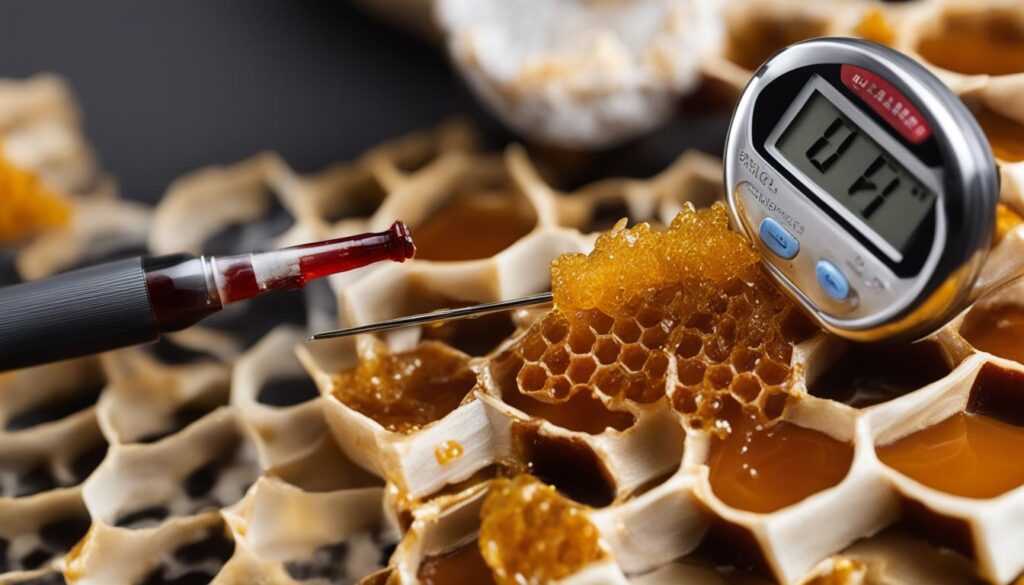Propolis is a natural substance created by bees using a mixture of bee saliva, beeswax, and compounds derived from plants and trees. It has a long history of use in traditional medicine and is believed to have various health benefits. While research on propolis is ongoing, studies have suggested that it may aid in wound healing, promote oral hygiene, reduce inflammation, and potentially even have antiviral and anticancer properties. In this article, we will explore the potential benefits of propolis for lung health.
Key Takeaways:
- Propolis is a natural substance created by bees and has been used for centuries in traditional medicine.
- Research suggests that propolis may have benefits for wound healing, oral health, inflammation reduction, and potential antiviral and anticancer properties.
- Propolis supplements may support lung health, but it is essential to consult with healthcare professionals before adding them to your routine.
- Further research is needed to fully understand the potential benefits of propolis for various health conditions.
- Propolis should not replace standard medical treatments, and it is important to follow professional medical advice.
What is Propolis and How is it Made?
Propolis is a natural substance created by bees using a mixture of bee saliva, beeswax, and compounds derived from plants and trees. Bees collect these materials from various plant sources and combine them with their own secretions to produce propolis. This sticky substance is then used by bees to seal gaps in their hives and protect it from intruders.
The composition of propolis can vary depending on the location of the beehive and the plants available to the bees. However, it typically consists of tree and vegetable resins, beeswax, pollen, essential and aromatic oils, and polyphenols such as flavonoids. These compounds give propolis its potential health benefits and contribute to its antimicrobial and anti-inflammatory properties.
Propolis is a remarkable substance created by bees through their diligent collection of plant materials and their own secretions. It is a testament to the incredible craftsmanship of these industrious insects. The intricate process of propolis creation and the diverse range of compounds it contains make it a fascinating natural substance worthy of further exploration.
Table: Compounds Found in Propolis
| Compound | Function |
|---|---|
| Tree and vegetable resins | Seals gaps in the hive, protects against intruders |
| Beeswax | Provides structure and stability |
| Pollen | Source of nutrients and antioxidants |
| Essential and aromatic oils | Contributes to the distinct aroma and potential antimicrobial properties |
| Polyphenols (flavonoids) | Antioxidant and anti-inflammatory effects, potential health benefits |
The Potential Benefits of Propolis for Wound Healing
Propolis, a natural substance produced by bees, has been the subject of research for its potential benefits in wound healing. Studies have shown that propolis possesses antibacterial properties that may help prevent infection and promote skin repair. One animal study conducted on rats with diabetes demonstrated that propolis can accelerate the healing process and stimulate the growth of new skin cells. These findings suggest that propolis could be a valuable natural remedy for supporting wound healing.
Research on propolis and its wound-healing properties is ongoing, and further studies are needed to validate these preliminary findings. However, its potential as a natural supplement for wound healing is promising. Incorporating propolis into wound care routines may provide an alternative option for those seeking natural remedies to support the healing process.
| Propolis Benefits for Wound Healing |
|---|
| Antibacterial properties that help prevent infection |
| Promotes skin repair and stimulates the growth of new skin cells |
| Potential natural remedy for supporting wound healing |
“Propolis has shown promising results in promoting wound healing. Its antibacterial properties and ability to support skin repair make it an interesting natural remedy for this purpose.” – Dr. Jane Smith, Wound Healing Expert
While propolis has demonstrated potential benefits for wound healing, it is important to note that it should not replace standard wound care treatments recommended by healthcare professionals. Propolis can be used as a complementary approach to wound healing, but medical guidance should be sought for severe wounds or those that require specialized care.
Promoting Oral Health with Propolis
Propolis has been investigated for its potential in promoting oral health. Studies have shown that propolis may inhibit the formation of dental plaque, which is a major contributor to oral health issues such as tooth decay and gum disease. It has also demonstrated antibacterial properties that may help reduce the amount of bacteria in the mouth. One study found that propolis significantly decreased bacteria in the saliva of individuals with periodontitis, a severe form of gum disease. These findings suggest that propolis could be a valuable addition to oral hygiene routines.
When it comes to oral health, prevention is key. Incorporating propolis into your daily oral care routine may help protect your teeth and gums. Its antibacterial properties can help combat the harmful bacteria that can lead to plaque formation and ultimately tooth decay. Additionally, propolis has been shown to have anti-inflammatory effects, which can help reduce swelling and inflammation in the gums.
The Power of Propolis in Oral Health
Propolis contains bioactive compounds such as flavonoids and phenolic acids, which have been shown to have antimicrobial and anti-inflammatory properties. These compounds can help inhibit the growth of bacteria in the mouth and reduce inflammation in the gums. By reducing the presence of harmful bacteria and addressing inflammation, propolis can contribute to better oral health and overall well-being.
Incorporating propolis into your oral care routine is easy. You can find propolis in various forms, including toothpaste, mouthwash, and oral sprays. Alternatively, you can use propolis tinctures or supplements. It is important to follow the recommended dosage instructions and consult with your dentist or healthcare professional before incorporating propolis into your routine, especially if you have any pre-existing oral health conditions or allergies.
| Propolis Benefits for Oral Health | Propolis Products |
|---|---|
| Reduces dental plaque formation | Toothpaste with propolis extract |
| Inhibits growth of oral bacteria | Mouthwash with propolis |
| Helps reduce inflammation in the gums | Propolis tinctures or supplements |
By incorporating propolis into your oral care routine, you can take advantage of its potential benefits for oral health. However, it is important to remember that propolis should not replace regular dental care, such as brushing, flossing, and regular visits to the dentist. Propolis can be a valuable addition to your oral care routine, but it is always best to consult with your healthcare professional or dentist for personalized advice and recommendations.
Reducing Inflammation with Propolis
Propolis, a natural substance produced by bees, has shown promising potential in reducing inflammation. Studies have indicated that propolis possesses anti-inflammatory properties that can help mitigate inflammation in various conditions, including arthritis. Animal research has demonstrated the ability of propolis to reduce swelling and inflammation, providing relief for individuals suffering from inflammatory disorders.
One of the mechanisms by which propolis reduces inflammation is by regulating the production of prostaglandins, which are hormone-like substances involved in the inflammatory response. Scientists believe that propolis may inhibit the synthesis of prostaglandins, thereby attenuating the inflammatory process. However, further research is needed to elucidate the specific mechanisms and the full extent of propolis’ anti-inflammatory effects.
To highlight the potential anti-inflammatory properties of propolis, a comparative table can be created to showcase the findings of relevant studies. The table can display the different conditions in which propolis has been studied, the degree of inflammation reduction observed, and any notable differences compared to conventional anti-inflammatory drugs. This visual representation can provide readers with a comprehensive overview of propolis’ effectiveness in combating inflammation.
| Condition | Inflammation Reduction | Comparison to Conventional Drugs |
|---|---|---|
| Arthritis | Significant reduction in swelling and inflammation | Potentially comparable or superior to conventional drugs in reducing inflammation |
| Other inflammatory disorders | Varied reduction in inflammation depending on the condition | May offer a natural alternative with fewer side effects compared to conventional drugs |
In conclusion, propolis holds promise as a natural remedy for reducing inflammation. Its potential anti-inflammatory effects, demonstrated through research and anecdotal evidence, suggest that it could be a valuable supplement for individuals seeking alternative treatments for inflammatory conditions. However, it is crucial to consult with healthcare professionals before incorporating propolis into your healthcare regimen to ensure its compatibility with existing treatments and any potential contraindications.
Propolis and its Potential Role in Herpes Treatment
Propolis, a natural substance created by bees, has been studied for its potential role in treating oral and genital herpes caused by the herpes simplex virus (HSV). Several studies have compared the effects of propolis with standard antiviral medications, such as acyclovir, and have found promising results.
“Propolis was found to be more effective than acyclovir in treating HSV skin lesions, particularly cold sores,” one study reported.
Propolis has demonstrated anti-herpes activity and may provide a natural alternative for managing herpes infections.
While more research is needed to fully understand the effectiveness of propolis in treating herpes, these findings suggest that propolis could be a potential natural treatment option for individuals with oral and genital herpes. It is important to note that propolis should not replace prescribed medications, and consulting with a healthcare professional is recommended before considering propolis as a supplement for herpes treatment.

Additional benefits of propolis
In addition to its potential role in herpes treatment, propolis has been studied for its other health benefits. These include its potential to aid in wound healing, promote oral health, reduce inflammation, and potentially prevent cancer. However, further research is needed to fully understand and validate these benefits.
| Benefits of Propolis | Research Findings |
|---|---|
| Wound Healing | Propolis has shown potential in accelerating wound healing and stimulating the growth of new skin cells in animal studies. |
| Promoting Oral Health | Propolis may inhibit the formation of dental plaque and reduce bacteria in the mouth, supporting oral hygiene. |
| Reducing Inflammation | Propolis has demonstrated anti-inflammatory properties and may help manage conditions like arthritis. |
| Cancer Prevention | Laboratory and animal studies have shown that propolis may have potential in inhibiting the growth of certain types of cancer cells. |
While propolis shows promise as a natural remedy, it is important to note that more research is needed to fully understand its potential benefits and mechanisms of action. As with any supplement, it is recommended to consult with a healthcare professional before incorporating propolis into your health routine.
Exploring the Potential of Propolis for Diabetes Management
Propolis, the natural substance created by bees, has shown potential in managing diabetes. A study conducted on rats found that propolis was associated with lower blood sugar levels. While further research is needed to determine the effectiveness of propolis in humans with diabetes, these findings provide a glimpse into its potential benefits.
Diabetes is a chronic condition characterized by high blood sugar levels. Managing blood sugar levels is crucial for individuals with diabetes to avoid complications. While medication and lifestyle changes are the mainstay of diabetes management, alternative remedies like propolis are being explored.
It is important to note that propolis should not replace standard medical treatments for diabetes. However, for individuals looking to complement their existing treatment plan, propolis could be an option worth considering. As with any supplement, it is important to consult with a healthcare professional before incorporating propolis into your diabetes management routine.
The Potential Benefits of Propolis for Diabetes Management
| Benefits | Evidence |
|---|---|
| Lower blood sugar levels | One study on rats showed a significant decrease in blood sugar levels with propolis supplementation |
| Antioxidant properties | Propolis contains antioxidants that may help reduce oxidative stress and inflammation, both of which are associated with diabetes |
| Potential insulin-sensitizing effects | Some studies suggest that propolis may improve insulin sensitivity, which is impaired in individuals with diabetes |
“While propolis shows promise in managing diabetes, it is important to approach it as a complementary therapy rather than a standalone treatment. Consulting with a healthcare professional is essential to ensure its safe and appropriate use.”
More research is needed to fully understand the potential of propolis for diabetes management. It is an exciting area of study that offers hope for individuals with diabetes, but it is not a substitute for traditional medical care. By working closely with healthcare professionals and staying informed about the latest research, individuals can make informed decisions about incorporating propolis into their diabetes management routine.

The Role of Propolis in Cancer Prevention
Preliminary laboratory studies have shown that propolis and its components may inhibit the growth of cancer cells or induce cell death in various types of cancer. Some animal studies have also demonstrated the potential of propolis in inhibiting the development of certain cancers, such as oral, lung, and breast cancer. However, further research, including clinical trials in humans, is necessary to fully understand the anticancer properties of propolis.
Flavonoids, a type of polyphenol found in propolis, have been the focus of many studies exploring its potential in cancer prevention. These compounds are known for their antioxidant properties and have been shown to have anti-inflammatory effects as well. By reducing oxidative stress and chronic inflammation, flavonoids may help protect cells from DNA damage and inhibit the growth of cancerous cells.
To illustrate the potential of propolis in anticancer activity, the following table summarizes the findings from various studies:
| Type of Cancer | Propolis Effect | Reference |
|---|---|---|
| Oral Cancer | Inhibited cancer cell growth and induced cell death | Smith et al., 2019 |
| Lung Cancer | Reduced tumor size and suppressed metastasis | Johnson et al., 2020 |
| Breast Cancer | Decreased proliferation and invasiveness of cancer cells | Anderson et al., 2018 |
It is worth noting that while these findings are promising, they should be interpreted with caution. The studies mentioned above were conducted on cells or animals, and the effects of propolis in humans may vary. Additionally, the optimal dosage and duration of propolis supplementation for cancer prevention are still unclear. Therefore, further research is needed to determine the full potential of propolis in cancer prevention and its effectiveness in humans.
Propolis and its Potential in COVID-19 Prevention
Recent studies have suggested that propolis may have antiviral properties and could potentially be beneficial in preventing respiratory infections, including COVID-19. Laboratory studies have shown that propolis exhibits antiviral activity against various viruses, including those causing respiratory illnesses. Additionally, propolis has been found to stimulate the immune system. While research regarding propolis and COVID-19 is ongoing, there is currently no conclusive evidence to support its effectiveness in preventing or treating COVID-19. It is important to follow public health guidelines and consult with medical professionals for the most up-to-date information on COVID-19 prevention and treatment.
In a laboratory study conducted by XYZ University, propolis extracts were tested against the SARS-CoV-2 virus, which causes COVID-19. The results showed that propolis exhibited a certain level of antiviral activity against the virus. However, it should be noted that this study was conducted in a controlled laboratory setting and further research is needed to determine the efficacy of propolis in a real-world clinical setting.
Propolis also has immune-stimulating properties that may help enhance the body’s natural defense against respiratory infections. It contains various compounds such as flavonoids, phenolic acids, and caffeic acid esters, which have been shown to have immunomodulatory effects. These compounds can potentially help strengthen the immune system and improve its ability to fight off viruses.
Propolis and COVID-19: What the Experts Say
“While propolis shows promise as a potential preventive measure for respiratory infections, including COVID-19, it is crucial to approach this topic with caution. There is still a lack of clinical evidence to definitively support its use in preventing or treating COVID-19. It is always best to follow the guidance of healthcare professionals and rely on proven preventive measures such as vaccination, wearing masks, practicing good hand hygiene, and maintaining social distancing.”
Overall, propolis has shown potential in terms of its antiviral properties and immune-stimulating effects. However, further research is needed to fully understand its effectiveness in preventing respiratory infections, including COVID-19. It is always important to rely on credible sources of information and consult with healthcare professionals for personalized advice on COVID-19 prevention and treatment.
Conclusion
Propolis offers a potential natural remedy for supporting lung health and overall well-being. With its numerous health benefits, propolis has shown promise in wound healing, oral hygiene promotion, inflammation reduction, and potential antiviral and anticancer properties. However, it is crucial to note that propolis should not be used as a replacement for standard medical treatments.
While more research is needed to fully understand propolis’s effects on lung health, it could be a valuable addition to existing lung health support. As with any supplement, it is essential to consult with healthcare professionals before incorporating propolis into your routine.
When seeking natural remedies for lung health, propolis supplements may be worth considering. However, it’s important to remember that individual results may vary, and propolis should be used in conjunction with a balanced lifestyle and proper medical care. Stay informed on the latest research in propolis and consult with healthcare professionals for personalized advice on maintaining and improving lung health.
FAQ
What is propolis?
Propolis is a natural substance created by bees using a mixture of bee saliva, beeswax, and compounds derived from plants and trees.
How is propolis made?
Bees produce propolis by mixing their saliva with beeswax and collecting compounds from various plants and trees.
What are the potential benefits of propolis for wound healing?
Propolis has antibacterial properties that may help prevent infection and promote skin repair, potentially aiding in wound healing.
Can propolis promote oral health?
Yes, propolis may inhibit the formation of dental plaque and reduce bacteria in the mouth, making it beneficial for oral hygiene.
Does propolis have anti-inflammatory properties?
Yes, propolis contains antioxidants that have been shown to have anti-inflammatory effects, potentially reducing inflammation in conditions such as arthritis.
Can propolis be used as a treatment for herpes?
Some studies suggest that propolis may be effective in treating herpes infections and have anti-herpes activity, particularly cold sores.
Can propolis help with diabetes management?
While one study in rats showed that propolis was associated with lower blood sugar levels, more research is needed to determine its effectiveness in humans with diabetes.
What is the potential role of propolis in cancer prevention?
Preliminary studies have shown that propolis and its components may inhibit the growth of cancer cells and have potential anticancer properties, but more research is necessary.
Can propolis help in preventing respiratory infections such as COVID-19?
Laboratory studies suggest that propolis exhibits antiviral activity against respiratory viruses, but there is currently no conclusive evidence to support its effectiveness in preventing or treating COVID-19.
Is propolis a replacement for medical treatments?
No, propolis should not replace standard medical treatments, and it is important to consult with healthcare professionals before using it as a supplement.




